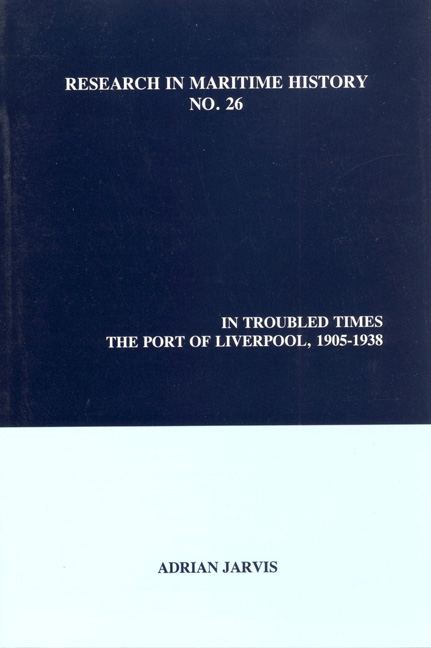Book contents
- Frontmatter
- Table of Contents
- List of Figures
- Foreword and Acknowledgements
- Conversion Factors for Imperial Measurements
- Introduction: The Port of Liverpool in 1905
- Chapter 1 The Port and Its Trade in 1905
- Chapter 2 Gladstone Dock
- Chapter 3 Not Before Time: The Board Keeps its Promise
- Chapter 4 Engineering, Management and Decision-making
- Chapter 5 Making the Customers Happy
- Chapter 6 Sand, Silt and Sewage: The Work of the Board's Dredgers
- Chapter 7 The Provision of Specialist Cargo Facilities
- Chapter 8 Into the Modern World?
- Conclusion: On the Eve of War
- Appendix: Port Efficiency: A Short Methodological Discourse
- A Note on Sources: Abbreviations
- Bibliography
- Index
Conclusion: On the Eve of War
- Frontmatter
- Table of Contents
- List of Figures
- Foreword and Acknowledgements
- Conversion Factors for Imperial Measurements
- Introduction: The Port of Liverpool in 1905
- Chapter 1 The Port and Its Trade in 1905
- Chapter 2 Gladstone Dock
- Chapter 3 Not Before Time: The Board Keeps its Promise
- Chapter 4 Engineering, Management and Decision-making
- Chapter 5 Making the Customers Happy
- Chapter 6 Sand, Silt and Sewage: The Work of the Board's Dredgers
- Chapter 7 The Provision of Specialist Cargo Facilities
- Chapter 8 Into the Modern World?
- Conclusion: On the Eve of War
- Appendix: Port Efficiency: A Short Methodological Discourse
- A Note on Sources: Abbreviations
- Bibliography
- Index
Summary
On the Eve of War
In the thirty or so years’ history of the port considered in this book it is possible, despite the disruption of the Great War both generally and more specifically in the shipping industry, to find marked continuities in the way the port worked. The most obvious of these was the structure of the port authority in that the members appeared to continue to be elected in the same way they had since 1857, and even the changes in the reality of the matter related in chapter four could not be said to represent any striking alteration in the way things worked. The system of Standing Committees remained essentially the same, pace the arrival and disappearance of the Trade Committee, and so did the system for appointing their senior staff. The power of the General Manager grew noticeably, but while the growth might have accelerated in the 1920s it was also in a sense a continuity in its own right, which can be traced right back to Daniel Mason's unsuccessful attempts to gain a little power here and there from Jesse Hartley back in the 1840s, passing through the sometimes childish squabbles of Miles Kirk Burton with the Lysters, father and son. What did change was the General Manager's relationship with the members, particularly after Warner was appointed in 1920. Once his feet were well under the desk they began to allow him responsibilities which previously they reserved to themselves, an expanded role which is well illustrated in the dealings with the Unemployment Grants Committee mentioned in chapter three. This had the important effect of freeing up time for consideration of the strategic issues which were the proper business of the Board and its committees; the discussion of trivia shows a marked reduction.
Another marked continuity is that of the Board's debt, which continued at such a high level that expenditure on capital improvements might have its timing determined not by the Board's choice but by the ruling rate of interest - or by its best guess at what interest rates would be in the future. This was particularly difficult in the early stages at Gladstone, as the bank rate typically changed about five or six times a year, and in 1910 it changed nine times.
- Type
- Chapter
- Information
- In Troubled TimesThe Port of Liverpool, 1905-1938, pp. 205 - 210Publisher: Liverpool University PressPrint publication year: 2003



